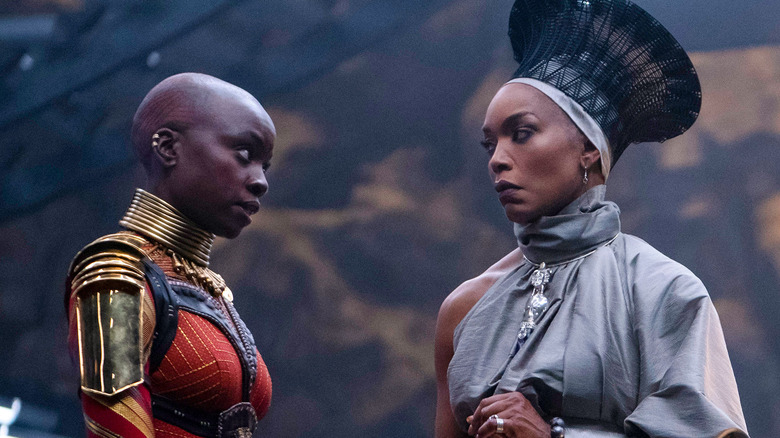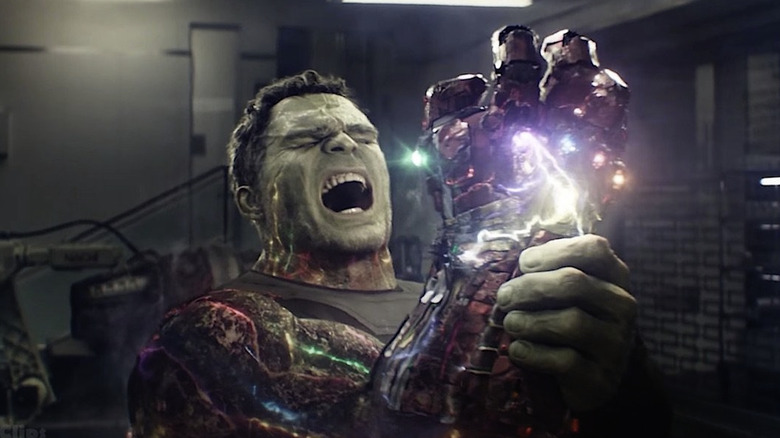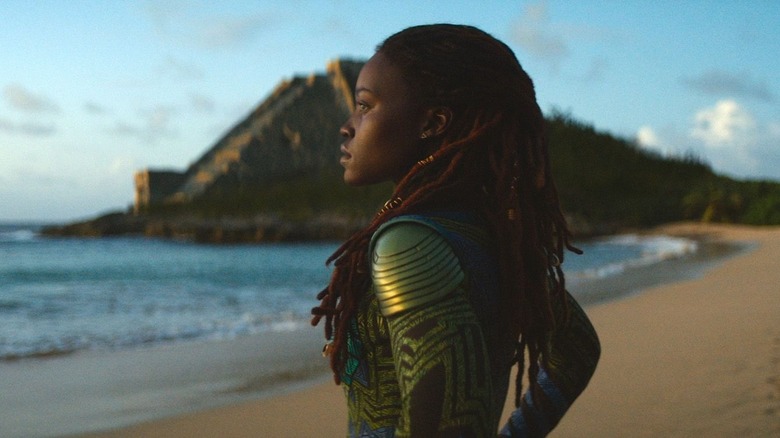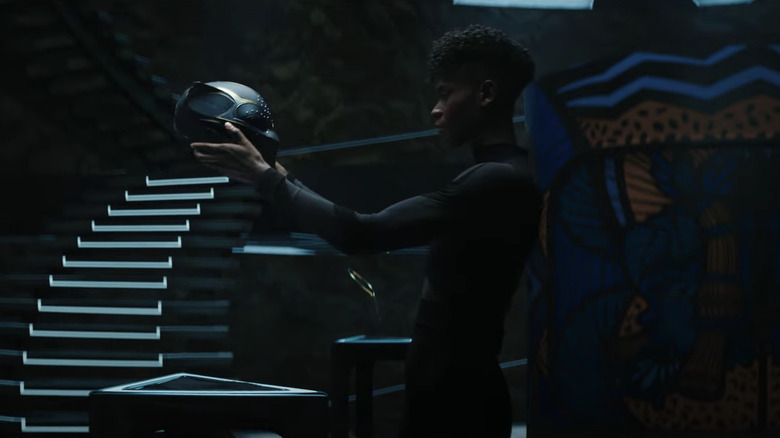With Black Panther: Wakanda Forever, The MCU Is Moving On From The Blip
"Black Panther: Wakanda Forever" has a lot on its plate. It's a film dedicated to the memory of our beloved Chadwick Boseman, a family drama centered around the inheritance of the Wakandan throne, and an introduction to Tenoch Huerta Mejía's Namor, the mutant serpent ruler of Talokan. At a dense runtime of nearly three hours, it's understandable some concessions had to be made to balance all of the film's ambitions.
However, with "Wakanda Forever" we're once again witnessing a growing pain with lots of precedence in the Marvel Cinematic Universe, the slow and gradual irrelevance of a recent major life-altering event in the MCU canon. Thanos's Snap that wiped half of the universe's population away for five entire years (dubbed in-universe as "the Blip" in "Spider-Man: Far From Home," and later clarified as distinct from the Snap by Kevin Feige) and its eventual reversal are still fresh wounds the world of the MCU has only had a few years to heal from. As each project brings us farther away from 2018's "Avengers: Endgame," we've been seeing the topic of the Blip continue to fall out of relevance.
In "Wakanda Forever," there is not a single verbal reference to the Blip. Given that this film is so focused on catching us up with the kingdom of Wakanda since the last "Black Panther," it does strike a little odd. This represents a tough issue a lot of MCU projects have to contend with when it comes to worldbuilding. Is it worthwhile to emotionally invest in the lore of this expanded universe within every project, or does disconnection from the wider world have its own value?
Major spoilers ahead for "Black Panther: Wakanda Forever."
Selective MCU memory
As mentioned earlier, the Blip is far from the only case of the MCU's selective memory. One of the first significant events of the MCU was at the center of the original 2012 "Avengers" film: the Battle of New York. Arguably, this is the event that should have fully driven the "connectedness" of the universe — it was the very first public exposure of heroes teaming up to defeat an alien threat. Unfortunately, other than influencing the origin story of "Spider-Man: Homecoming" villain Vulture, there's very little mention of the Battle of New York in the main canon. It has, however, greatly influenced the ABC era of Marvel shows which are on their own muddy ground when it comes to canon.
The Battle of New York sets the stage for the crime-infested Hell's Kitchen we see in Netflix's "Daredevil" series, and its ripple effect on the wider MCU world is what drove "Agents of SHIELD" and its monster-of-the-week format. Despite low viewership, "SHIELD" was the little Marvel show that could — it was constantly directly influenced by the MCU films and their major events, but sadly that creative exchange was never mutual (partly due to behind-the-scenes leadership drama).
When SHIELD turned out to be infiltrated by HYDRA in "Captain America: The Winter Soldier," it was never unpacked by any of the following films; it did however significantly impact the drama of "Agents of SHIELD." The Sokovia Accords that drove our heroes apart in "Captain America: Civil War" similarly made little impact. Only recently was it explained that they were repealed in a throwaway line in "She-Hulk: Attorney At Law."
A mid-credits reference to the Blip
As much as the Blip's lasting significance is flawed, in all fairness, there is much more direct object permanence with it than most major MCU events.
The second Disney+ Marvel Studios produced series, "The Falcon and the Winter Soldier" involves the Flagsmashers, a group of terrorists that sought to return society back to how it was after the Snap. "Spider-Man: Far From Home" nicknamed the Blip and showed us insight into how some citizens have aged up in the time others have been suspended in spacetime. "WandaVision" directly shows us Monica Rambeau's personal experience during the Snap and the Blip, showing how it felt like mere minutes for those who were dusted.
Though "Wakanda Forever" doesn't explicitly namedrop the Snap or the Blip, the mid-credits scene does have its implications towards its impact. When Shuri (Letitia Wright) visits Nakia (Lupita Nyong'o) at her school in Haiti, Nakia introduces Shuri to her son, Toussaint (Divine Love Konadu-Sun) that she secretly had with T'Challa before he passed. Since he is about six years old, he's implied to have grown up during the five year time jump in between the Snap and the Blip.
The Multiverse Saga is coming
Although it would have been nice to have official confirmation of how this works out timeline-wise, it's ultimately fine that Ryan Coogler's movie prioritizes the emotional beats over the logistics of the universe. As much as we'd like to see the MCU's world-building make more of an impact on the drama and characters of this universe, it shouldn't be at the detriment of other fulfilling character beats. What we have in this scene is a moment of catharsis, the continuation of life in the grief and devastation of sudden death; a new potential heir to the Wakandan family throne.
Honestly, a lot has happened in the MCU at this point. Even for avid fans of the universe, it's getting more and more difficult to keep track of every moving piece. While these occasional moments of selective memory can be distracting, it's important to realize that this is mass-market entertainment at the end of the day, and alienating an audience with layers of pre-requisite knowledge would come at a greater cost.
Now that we're over four years apart from "Avengers: Endgame" and its release, the relevance of the Blip has only declined. As "Spider-Man: No Way Home" and "Doctor Strange in the Multiverse of Madness" plant the seeds for the new planned Multiverse Saga, it's probably not on Kevin Feige's mind to keep referencing the past. Even though the Snap was a significant trauma for the MCU, there's even more collateral damage that will be experienced very soon.
"Black Panther: Wakanda Forever" is now playing in theaters.



